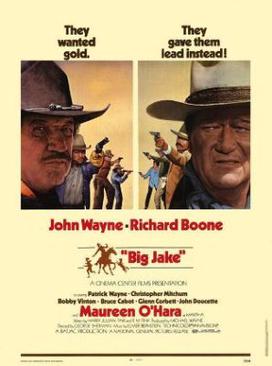
The film has an opening gambit that nearly feels unbecoming of a John Wayne picture and yet there’s something simultaneously quite riveting about it. You can’t quite take your eyes off of it, waiting to see what will come to pass.
Our narrator sets the scene in 1909 where, while the East is rising in a constant deluge of modernization, the West is still as ornery as ever. What follows is a full display of that reality as a band of thugs led by John Fain (Richard Boone) rides into a sprawling ranch with one thing on their minds.
There’s a sense that this late-period work from veteran director George Sherman, his last film, in fact, is well aware of Butch Cassidy and The Sundance Kid (1969) and The Wild Bunch (1969) generation and it readily ups the violent content. Although it is a modern western in this sense, there are still blatant signs of not only antiquity but the deep-rooted hierarchy of the West along ethnic lines.
With his good buddy from the early days behind the camera, John Wayne has another personal vehicle on his hands. There’s no doubting the centrality of his presence on the plot even if his entrance is delayed. The stock company is rich and deep as per usual but there is a myriad of young guns too and Duke had a habit of making his work a family affair.
Bobby Vinton gets a near token cameo while little Ethan Wayne becomes crucial to keeping the plot chugging forward as the thugs run off with the boy expecting a ransom in return for his life. Duke’s other two grown sons are played by Patrick Wayne and Bob Mitchum’s boy Christopher. Though not quite family, Maureen O’Hara makes a lovely appearance as the strong-willed ranch matriarch who has long been estranged from her husband Jake McCandles. The scenes with her longtime costar end in a blink of an eye but with such a meaningful cinematic history together they leave the necessary impression.
Like most of these later works, similar to a McClintock! (1963), Big Jake is unequivocally a must-see for the John Wayne faithful — people who could watch him in just about anything will find time to be heartily entertained.
It’s somewhat of a menacing western drama but there’s still ample room for a cheeky and rip-roaring good time. Big Jake, though more violent than some of Duke’s predecessors nevertheless has his mark of approval all over it. There are falls in the mud. He gets plenty of time to smack his sons around and also receives his share of wallops as retribution. Pulling buckshot out of backsides and dousing them with whiskey is all in a day’s work. And Duke is as vociferous as ever.
That’s what will get people to stay. Because it’s one thing about John Wayne that is rather refreshing. Like him or not, you know full-well where he stands and how he’s going to play it. Larger-than-life and tough-as-nails but with unquestioned integrity. I’m drawn to that like many others because I come from a wishy-washy generation. But far more than that, even if I don’t necessarily agree with everything he does, the Duke never seems to do something purely out of spite. Instead, he has some deep-seated convictions.
He plays Big Jake McCandles with his typical presence that knows few equals in terms of longevity or sheer durability. Wayne certainly understands how to command a room and while everyone else tries to upstage him no one has the gumption. Richard Boone is probably the only old-timer who has the wiles and the pedigree to try to steal his spotlight and he’s, of course, the ringleader of our villains.
Despite being a man who left his family long ago, McCandles returns on a moment’s notice to rescue his kidnapped grandson. He’s a no-good old coot but there is that aforementioned sense of moral integrity. He’s has a funny way of showing it but he cares about family.
The truth is, he sees out his objective with his typical dogged resilience laced with worldly wisdom and tenacity. The conflict spawns from one son who is rightfully bitter and another son who seems like he’s traded out the past for new-fangled gadgetry. In the end, it seems the tried-and-true methods prove most effective. Wayne is joined in the task at hand by his feisty canine named “Dog” and a veteran Apache tracker named Sam.
Elmer Bernstein’s scoring automatically evokes layers upon layers of added richness from any western scenery and he’s somehow able to perfect everything that is resplendent and majestic about this way of life. There’s a deep abiding understanding of what The West meant and what men stood for.
Their final destination comes in a bustling boom town with thugs milling about and everyone looking to get a hand in on the cash payload that the McCandles have hauled around in order to save their young kin.
We know it’s only a matter of time before things come to a head. Of course, Duke gives it a bit of a kick in the rear by instigating barroom brawls to rile up the masses as a quality distraction. The resulting payoffs are as expected and gut-bustingly uproarious. And of course, John Wayne gets the last laugh of all from inside the shower stall of a barbershop followed by a final showdown where every member of the McCandle clan gets their own chance at redemption.
There’s nothing cutting edge here but this is a story of the dwindling West and so when that’s what your story is about, I think it can be said that Big Jake succeeds in these modest regards. After all, it’s a self-selecting film because anyone who wants to see it will be satiated and anyone else probably won’t search it out anyway. John Wayne has that influence on people even today.
3.5/5 Stars
